
The Trilateral Commission is a nongovernmental international organization aimed at fostering closer cooperation between Japan, Western Europe and North America. It was founded in July 1973 principally by American banker and philanthropist David Rockefeller, an internationalist who sought to address the challenges posed by the growing economic and political interdependence between the U.S. and its allies in North America, Western Europe, and Japan.
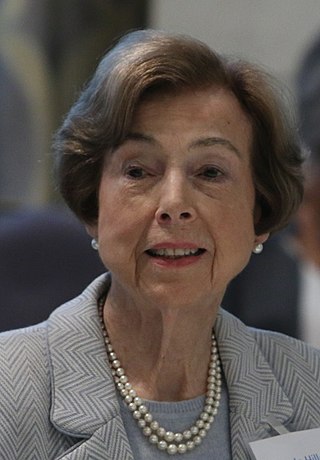
Carla Anderson Hills is an American lawyer and a public figure. A member of the Republican Party, she previously served as the 5th United States Secretary of Housing and Urban Development under President Gerald Ford from 1975 to 1977 and as the 10th United States Trade Representative under President George H. W. Bush from 1989 to 1993. Hills was the first woman to hold each of those posts, the third woman ever to serve in a presidential cabinet, and the first appointed to both cabinet and cabinet-rank positions. Hills is the earliest-serving living former U.S. Cabinet member.

Robert Bruce Zoellick is an American public official and lawyer who was the 11th president of the World Bank Group, a position he held from July 1, 2007, to June 30, 2012. He was previously a managing director of Goldman Sachs, United States Deputy Secretary of State and U.S. Trade Representative, from February 7, 2001, until February 22, 2005. Zoellick has been a senior fellow at Harvard's Belfer Center for Science and International Affairs since ending his term with the World Bank. He is currently a Senior Counselor at Brunswick Group.

Stephen John Hadley is an American attorney and senior government official who served as the 20th United States National Security Advisor from 2005 to 2009. He served under President George W. Bush during the second term of his administration. Hadley was Deputy National Security Advisor during Bush's first term.

Robert Dean Blackwill is a retired American diplomat, author, senior fellow at the Council of Foreign Relations, and lobbyist. Blackwill served as the United States Ambassador to India under President George W. Bush from 2001 to 2003 and as United States National Security Council Deputy for Iraq from 2003 to 2004, where he was a liaison between Paul Bremer and Condoleezza Rice.
The Aspen Institute is an international nonprofit organization founded in 1949 as the Aspen Institute for Humanistic Studies. The institute is headquartered in Washington, D.C. It also has campuses in Aspen, Colorado, its original home.
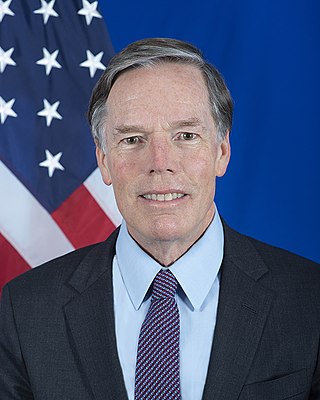
Robert Nicholas Burns is an American diplomat and academic who has served as the United States ambassador to China since 2022.
The Washington Institute for Near East Policy is a pro-Israel American think tank based in Washington, D.C., focused on the foreign policy of the United States in the Near East.

The United States foreign policy toward the People's Republic of China originated during the Cold War. At that time, the U.S. had a containment policy against communist states. The leaked Pentagon Papers indicated the efforts by the U.S. to contain China through military actions undertaken in the Vietnam War. The containment policy centered around an island chain strategy. President Richard Nixon's China rapprochement signaled a shift in focus to gain leverage in containing the Soviet Union. Formal diplomatic ties between the U.S. and China were established in 1979, and with normalized trade relations since 2000, the U.S. and China have been linked by closer economic ties and more cordial relations. In his first term as U.S. president, Barack Obama said, "We want China to succeed and prosper. It's good for the United States if China continues on the path of development that it's on".
Membership in the Council on Foreign Relations comes in two types: Individual and Corporate. Individual memberships are further subdivided into two types: Life Membership and Term Membership, the latter of which is for a single period of five years and is available to those between the ages of 30 and 36 at the time of their application. Only U.S. citizens and permanent residents who have applied for U.S. citizenship are eligible. A candidate for life membership must be nominated in writing by one Council member and seconded by a minimum of three others.
In international relations, the term smart power refers to the combination of hard power and soft power strategies. It is defined by the Center for Strategic and International Studies as "an approach that underscores the necessity of a strong military, but also invests heavily in alliances, partnerships, and institutions of all levels to expand one's influence and establish legitimacy of one's action."
The Stanford US–Russia Forum (SURF) is an organization dedicated to bringing students at leading Russian and American universities together for research in public policy, business, economics and many other disciplines. The program begins with a fall conference in Russia, followed by six months of work on collaborative research projects and a capstone conference in the spring at Stanford University. Currently in its tenth year, more than 400 undergraduate, graduate, and professional school students from Russia and the U.S. have participated in the program.
Cesar Conde is an American media executive currently serving as chairman of the NBCUniversal News Group, overseeing NBC News, MSNBC, and CNBC. Prior to this, Conde was chairman of NBCUniversal International Group and NBCUniversal Telemundo Enterprises. Before that, he was president of Univision's networks division.
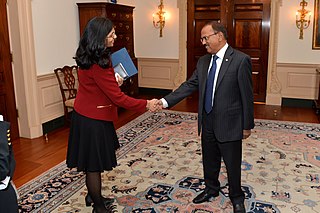
Nisha Biswal née Desai is an American businesswoman and public official in the United States. Biswal is the Deputy CEO of the U.S. International Development Finance Corporation. She previously served as Senior Vice President for international strategy and global initiatives and oversees South Asia programs at the United States Chamber of Commerce. Prior to this, she served as the President of the US-India Business Council at the US Chamber of Commerce. Previously, she has also served as Assistant Secretary of State for South and Central Asian Affairs in the United States Department of State under President Barack Obama from 2013 to 2017. Biswal was the first South-Asian American to hold this position. She oversaw the U.S.–India strategic partnership during a period of unprecedented cooperation, including the launch of an annual U.S.–India Strategic and Commercial Dialogue. Biswal was awarded the prestigious Samman Award by the President of India in January 2017. Biswal was also instrumental in launching the US-Bangladesh Partnership Dialogue, the C5+1 Dialogue between the United States and the Central Asian States of Kazakhstan, Kyrgyzstan, Tajikistan, Turkmenistan and Uzbekistan. Biswal also serves on the United States Institute of Peace International Advisory Council, on the Afghanistan Study Group and is on the Board of Directors for the Institute for Sustainable Communities, the Leadership Council for Women in National Security and is active in Democratic politics.
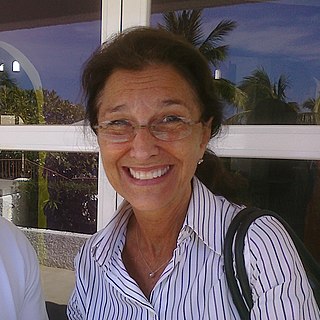
Jane Wales is an American non-profit executive and former US government official who has served on the boards of directors of and founded many institutions. She is the Vice President of the Aspen Institute, and was the CEO of the World Affairs Council of Northern California for 20 years before resigning in 2019. She was also the founder and CEO of the Global Philanthropy Forum, She helped found the African Philanthropy Forum and the Brazilian Philanthropy Forum, and was the initial Executive Director of the Elders. Moreover, she advises many philanthropists, chairs the board of the non-profit consultancy FSG, and is a member of the board of the Center for a New American Security and OpenCorporates. She serves on the advisory boards of the Generosity Commission and the Stanley Foundation. Her articles have appeared in The Guardian, the Stanford Social Science Review, Aspen Ideas Magazine and other publications. She is frequently interviewed on national security and economic development issues on television and public radio.
Michael "Mickey" Bergman is the Vice President and Executive Director of the Richardson Center for Global Engagement. He also teaches as an adjunct professor at Georgetown University's Walsh School of Foreign Service, where his graduate level courses focus on the art of emotional intelligence in International Relations and negotiations. He has pioneered the field of Fringe Diplomacy, an area of global engagement that connects people in arenas typically left void by governments and NGOs. Mickey Bergman has become known as an expert in the fields of Cuba, North Korea, and Myanmar. Nominated for the Nobel Peace Prize, alongside Former Governor Bill Richardson; Mickey has led his team at the Richardson Center to facilitate the release of more political prisoners than any other organization, including American Student, Otto Warmbier, from North Korea, and Princeton student, Xiyue Wang, from Iran. Mickey creates new political capital by leading Professional Exchange Programs to frontier countries such as North Korea, Myanmar, Cuba, Lebanon, and others. He has worked as Executive Director of the Global Alliances Program at the Aspen Institute. He is also the Founder and President of the Solel Strategic Group (SSG). Mickey has published numerous articles, interviews, and opinion pieces in the New York Times, Washington Post, International Herald Tribune, Boston Globe, Foreign Policy Online, and Huffington Post. Mickey also has been featured as a subject matter expert for television interviews on CNN, ABC, CBS, Fox News, I24news, Global News, and ABC News Australia.

Kiron Kanina Skinner is a former Director of Policy Planning at the United States Department of State in the Trump administration. Skinner is presently the Taube Professor of International Relations and Politics at the Pepperdine University School of Public Policy, where she teaches graduate courses in national security and public leadership. Prior to that, she was the Taube Professor of International Relations and Politics at Carnegie Mellon University, and the founding director of the Institute for Politics and Strategy and associated centers at the university. She is also the W. Glenn Campbell Research Fellow at the Hoover Institution. After leaving the Department of State, she returned to her position at Carnegie Mellon University until stepping down in 2021.

Tarun Das is an Indian industrialist, corporate executive, writer and a former Chief Mentor of the Confederation of Indian Industry (CII). He served CII from 1967 to 2004 as its director general and from 2004 to 2009 as its chief mentor.
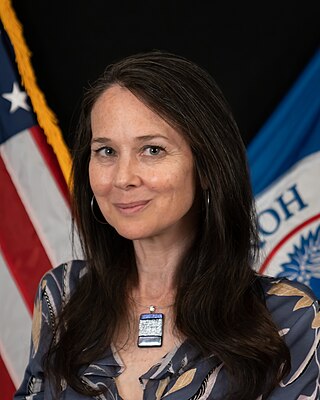
Jen Easterly is an American intelligence and former military official who is serving as the director of the Cybersecurity and Infrastructure Security Agency in the Biden administration. She was confirmed by a voice vote in the Senate on July 12, 2021.

Elizabeth C. Economy is an American scholar, foreign policy analyst, and expert on China's politics and foreign policy. She is Senior Advisor for China to the Secretary of Commerce in the Biden administration and Senior Fellow at the Hoover Institution at Stanford University.













